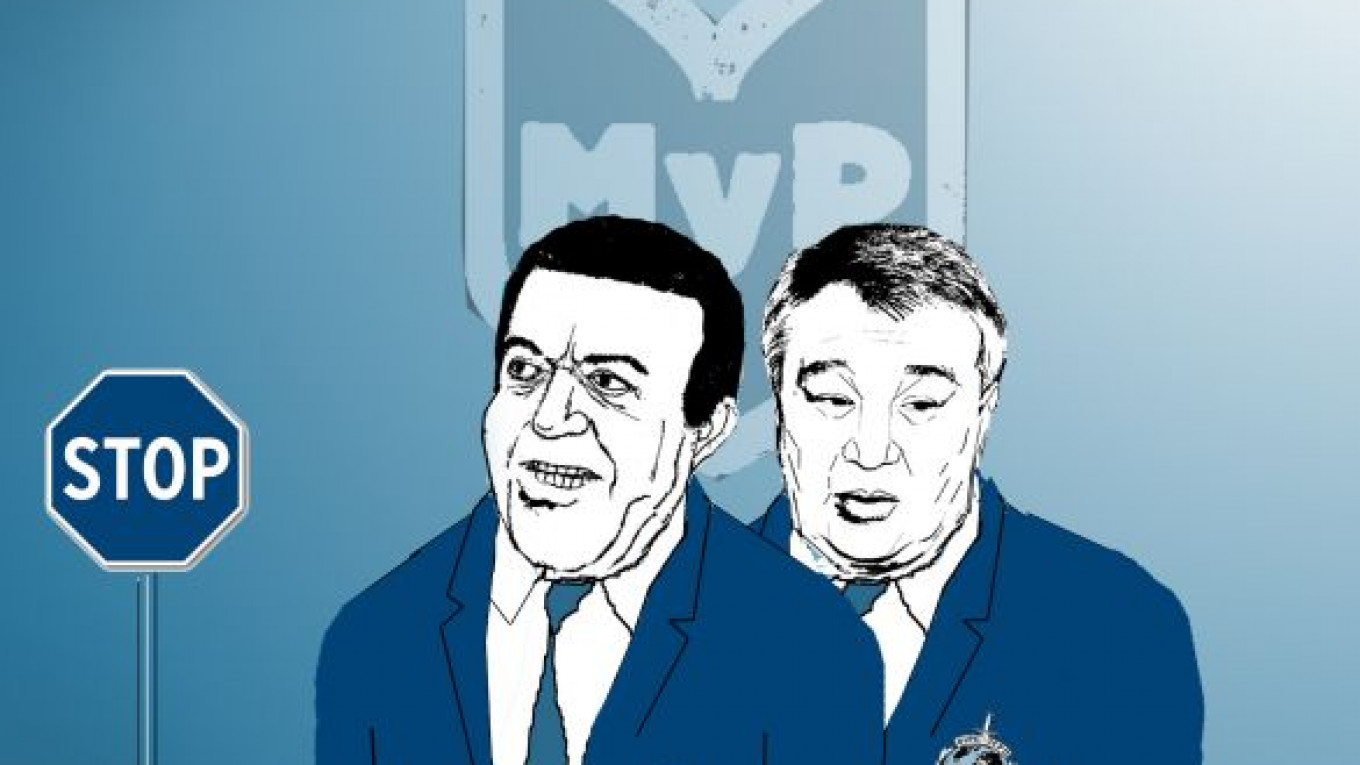This week, crooner Iosif Kobzon had to cancel his tour of the United States after yet another refusal of a visa, based on his alleged links to organized crime and drug trafficking. That did not stop Dmitry Medvedev and Vladimir Putin from dropping into his son's beer joint on Novy Arbat.
As if that were not confusing enough, Alimzhan Tokhtakhunov, one of the world's most wanted fugitives or smiley patrons of the arts, depending on which publication you read, made his acting debut in a detective drama on Rossia television — as a criminal boss.
The story of the United States refusing visas to Kobzon, 74, a kind of Russian Frank Sinatra, has been around so long that I thought it might be an urban myth. But no. The Foreign Ministry issued an indignant statement last week and Foreign Minister Sergei Lavrov said in a television interview that he had taken the case right up to discussions with U.S. Secretary of State Hillary Clinton, after Kobzon was refused a visa for concerts in the United States over the Victory Day holidays.
Kobzon sang one of the best Soviet popular songs ever, "Moments," the theme tune to the 17 Moments of Spring spy series. He's an old-school pro who wears an improbable toupee. He doesn't mime and has made numerous "final" tours without being able to kick the singing habit. And he is a tough Jewish kid from the streets of Dnipropetrovsk, who on one television documentary rolled up his sleeves to show his tattoos. On the down side, he is a United Russia deputy.
Lavrov said the U.S. documents cited Kobzon's involvement in "organized crime" and even possibly drug trafficking, without providing any proof. He said Kobzon has been refused a visa three or four times.
The United States obviously has what it considers pretty good reasons to so consistently deny a visa to one of Russia's best-known singers, and a legislator to boot. And it would be strange if it made these public. On the other hand, Kobzon has made repeated attempts to get a visa, showing that he feels he has been wronged. And it does seem extraordinary that Kobzon at 74 could be a threat.
Kobzon has said his more than five decades as a singer have put him in contact and friendship with some shady characters, but his links with crime go no further than that. A convincing argument, although the same would surely go for most Russian veteran pop stars — Alla Pugachyova, Valery Leontyev — who have set up a colony in Miami untroubled by the State Department.
Kobzon's son Andrei appeared in front of the cameras on Monday — defiantly bald — as Putin and Medvedev tucked into beer, potatoes and fish at his basement Zhiguli restaurant on Novy Arbat. It's hard to imagine that Kobzon's visa question did not come into the choice of venue.
The visa ban came at the same time as Russian state channel was airing "Mur," a prewar detective drama, with Tokhtakhunov playing a small role as a flat-capped gangster called Kitayets, or Chinese. "We're criminals but not traitors," he says at one point.
Tokhtakhunov is listed by Interpol as wanted by the United States for fraud. Last year, Forbes magazine featured him in its top 10 most-wanted fugitive list. His nickname is said to be Taivanets, or Taiwanese. In 2002, the U.S. government accused him of bribing Olympic figure-skating judges to fix the Salt Lake City event, a somewhat ludicrous crime that he denies. He is something of a socialite and told Ksenia Sobchak in GQ last year that his friends include — naturally — one Iosif Kobzon.
A Message from The Moscow Times:
Dear readers,
We are facing unprecedented challenges. Russia's Prosecutor General's Office has designated The Moscow Times as an "undesirable" organization, criminalizing our work and putting our staff at risk of prosecution. This follows our earlier unjust labeling as a "foreign agent."
These actions are direct attempts to silence independent journalism in Russia. The authorities claim our work "discredits the decisions of the Russian leadership." We see things differently: we strive to provide accurate, unbiased reporting on Russia.
We, the journalists of The Moscow Times, refuse to be silenced. But to continue our work, we need your help.
Your support, no matter how small, makes a world of difference. If you can, please support us monthly starting from just $2. It's quick to set up, and every contribution makes a significant impact.
By supporting The Moscow Times, you're defending open, independent journalism in the face of repression. Thank you for standing with us.
Remind me later.






